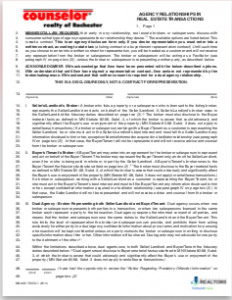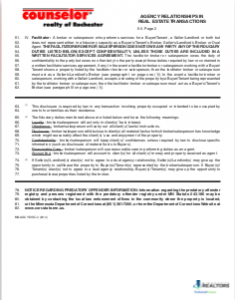Alex Mayer: Hi, this is Alex Mayer with Counselor Realty and what I’m what I’m going to do very quickly is go over the Agency Relationships in real estate transaction disclosure. We as realtor agents are required to go over this with people at first instance of contact. That’s the language we realtors use in this business. And I just want to make sure that I’m covering this with you.
I know often times I don’t have the opportunity to actually personally sit down with people on the other side and I want to make sure that you have access to this. Anyways, I’m going to share my stream here quickly and then I’m going to go over that.
Perfect, so first off this is the Agency Relationships in real estate transactions. And I want to point out that in Minnesota state law does require that in early in any relationship, real estate brokers or salespersons must discuss with consumers what type of agency representation or relationship that they desire or have. Okay?
This is an Agency Relationships disclosure form so it’s not a representation contract, okay? In fact we have to state here that you must enter into a written contract according to state law in order to actually have representation. One of these forms that I’m about to go over here in a minute.
This is just a disclosure form only, so what we usually will do if we’re meeting people out and about, and we’re talking about real estate and we really haven’t had a chance to talk about representation or anything about that. For me anyways, I make sure to go over this right away because I want to make sure that you know exactly what you’re getting into, who I represent, and what sort of capacity I will be representing you if we came to an agreement there.

So first off, I just want to explain that there are seller’s agents. These agents represent the seller’s solely. When you sign into a listing contract, that agent has to look out for your best interest as a seller overall. I do tell buyers that if you do call the name on the sign, that agent does represent the seller. So you just want to be cautious what you share as far as price terms and motivation, etcetera.
There are obviously buyer’s agents. A buyer’s agent essentially just represents the buyer, makes sure that they are kind of helping them throughout the process. I do tell people at the end of the day, it helps to have a buyer’s agent because then we could actually knock out three, four listings aside in an hour, an hour and a half. As opposed to kind of contacting three or four listing agents, who do represent the seller, and try to work around their schedule. It just makes it an easier process overall. And in many situations, if it’s listed on the MLS, there’s a coop paid out the buyer’s agents, who many times the buyer doesn’t pay commission there.
Dual agency is an important part to talk about here. It’s not just based off of the agent representing. So dual agency can be a situation where the agent represents both the buyer and the seller in the same situation, but it’s actually the overall brokerage in general. So in this situation, you know I work for Counselor Realty. So if I were representing someone as a listing agent or a seller’s agent and then a buyer’s agent here in my office actually brought in a buyer, that would be considered dual agency.
I do tell people that the things we cannot disclose in those sort of situations are price, terms, and motivation, okay? We gotta make sure that we’re protecting our clients. There is limitations to dual agency in that sort of situation. We can’t make certain recommendations there but I do want to point out that with the limitations disclosed, if you choose not enter to or agree to dual agency in a written agreement, you may actually miss out on listings that are put out by that property. So I just want to make sure that I’m upfront about that and explain that.
The fourth, I’ll talk about this in a minute, it’s actually at the end of this. It’s a notice about predatory offender information. It’s actually at the end and I’ll get back to that here in a moment.

I do talk about what a facilitator is. A facilitator’s essentially someone who can do paperwork and they can do showings but they don’t actually have a representation, like a written contract. Unless it is actually specified. You can actually specify a written agreement in a facilitator agreement but they can’t do certain things like guidance, representation, or a lot of things that actually goes into having representation. In a fiduciary format, all that you are owed is confidentiality. It’s right here. It says you only get confidentiality, unless you enter into a written agreement for representation as a buyer and a seller.
Now obviously, to our facilitator agreement, if someone will operate in a facilitator format and then they were showing a property that was listed by their current brokerage, they are actually representing the seller in that scenario. So I just want to make sure that I point that out. Vice versa, if it was a situation where it was reversed and it was a seller-buyer reversal, that would also be situation as well.
This next part here is the really important. I call this my real estate consumer rights. I have a couple videos out there that go into this a little bit more thoroughly but I’m just going to go over this very briefly because I don’t want to take up all your time today. So this just explains what our fiduciary duties are. A lot of us, we are not paid on routine, we’re not paid hourly. We’re often times paid on commission, so we have certain responsibilities and duties to our clients. I just want to make sure I’ve explained that briefly.
So first off there’s loyalty. We have to look out for our client’s best interest. Obedience. We have to carry out all our client’s lawful instructions. I want to make sure I say that it is lawful, you know you can’t tell us to do something illegal. And then there’s also disclosure, so making sure that we disclose material facts. Now when I’m going on showings or representing my seller, I try to disclose everything that I possibly can. That’s an important part of this process as well. So confidentiality, it’s actually written in all of the relationships including the facilitator format. Reasonable care, I love that it says reasonable care ’cause someone somewhere must have got sued by somebody. But at the end of the day we have to make sure that we take care of our clients and perform our duties as best we can. Accounting is important because we’re talking about money and property and we want to make sure that we’re getting everything kind of taken care and that we’re doing that appropriately.

You know, I talked about this earlier. If a seller does not agree to a dual-agency relationship or a buyer doesn’t agree to a dual- agency representations agreement, the seller could not entertain an offer from a buyer’s agent who works for the same brokerage. In that sort of situation, they did not agree. Likewise, if a buyer did not agree to dual agency, they would not be able to view properties listed by that brokerage at the end of the day either.
And this last bit is kind of an interesting one. Kind of a notice on predatory offenders. I know I talked about it in the page prior. It’s just a statement that we cannot point at a house and say you know a sexual predator lives here. In fact, we as real-estate agents are not allowed to comment on quality on neighborhood. So I tell people to check out different websites that kind of verify that. You can always call the county, people would be more than happy to help you with that. But we cannot point at a house and say that a sexual predator lives there. It’s illegal for us to do that. They do give us a phone number and they also give us a website that you can go to to look over that information as well, so.
Thank you for taking the time to watch this. I hope that it helps you out with a lot of the questions that you could be having there.

